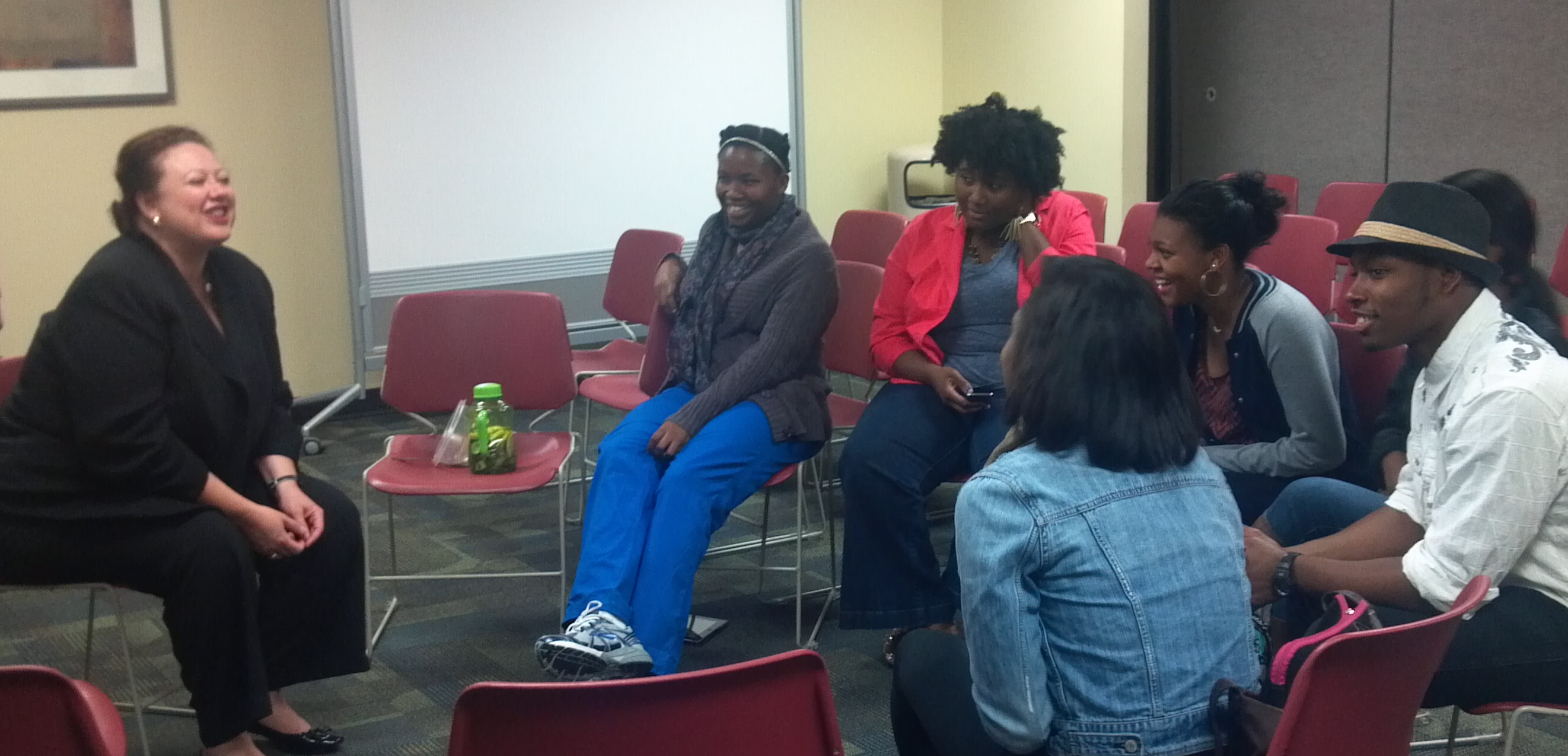The GMU chapter of NAACP has hosted two more “What’s Your Stance?” Series events in October. Below are coverage of each event:
Event – October 24, 2012
On October 24, 2012 the GMU NAACP chapter continued their “What’s Your Stance” series introducing education issues and policies. Their guest speaker for the evening was Tina Hone, founder of Silence of the Coalition an organization launched in January 2012 in order to be the voice of underrepresented students in the Fairfax County Public School system. Hone discussed ways to bridge the achievement gap between White and Asian students and Black and Hispanic students in Fairfax County.
“I felt compelled to make sure the playing field was equal for every child in America.” said Hone.
According to Hone, Fairfax County Public Schools consists of mostly minority students compared to white students that were shown according to the Fairfax County website
(http://www.fairfaxcounty.gov/demogrph/pdf/2011_youth_survey_report.pdf), take up 44.5 percent of the population as of the 2011-2012 school year. Secondly, of the students in Fairfax County, 25 percent come from less fortunate families.
Hone continued the discussion mentioning the purpose of the No Child Left Behind Act, which is now referred to as the Elementary and Secondary Act (ESEA), is to bridge the achievement gap in schools.
“Not enough is being done to close this achievement gap. They have been trying to build the achievement gap since I was fourteen years old, and I am old.” said Hone.
Although Hone believes more should be done to bridge the gap, she commended President Obama on the work he has done to help education policies.
“In this campaign, we need to look at the pressure the President has put on education.” said Hone.
One of the issues Hone explained regarding mending the gap was the use of standardized tests within the state.
“African American poor people do less well on standardized tests.” said Hone.
Furthermore, the success rates for White and Asian students are higher than success rates for Black and Hispanic students. According to the Huffington Post (http://www.huffingtonpost.com/2012/08/23/virginia-new-achievement-based-on-race_n_1826624.html) 45 percent of Black students and 52 percent of Hispanic students are required to pass the math standardized tests as opposed to 68 percent of White students and 82 percent of Asian students being required to pass this test. Hone wants to make sure that each student has the same opportunity as their peers regardless of their racial background.
“The most pressing issue to me is for as many brothers and sisters from the poorest neighborhoods to make it out.” said Hone.
Even with a law degree, Hone was an instructor through the Teach for America program and expressed that she understood the challenges of teachers in the classroom. She mentioned the importance of programs like Teach for America.
“Some of our best teachers are asking to go to tougher schools.” said Hone.
A final issue that Hone brought up was about evaluating the teaching profession.
“There are still teachers teaching who don’t have our kids best interest at heart.” said Hone.
In Hone’s last remarks, she informed Mason students that in countries such as Finland, it is harder to be a teacher than getting accepted into Medical School.
Event – October 11, 2012
On October 11, 2012 the George Mason chapter of the National Association of Advancement of Colored People (NAACP) held their second segment of their “What’s Your Stance” series. The topic at hand was Women’s Health and Cortney Hughes-Rinker, a Mason Assistant Professor, Anthropology; Sociology & Anthropology led the discussion.
The first question asked was, “Why are women’s rights important in politics?”
Rinker continued with 4 solutions to the question. The first being, women’s bodies are fields of contest, the second being women should have control over their bodies and not a government with a majority of male politicians; the third being the concept on war on women is not just about women’s health; and lastly, politicians should not make women and their bodies interconnect.
Mason students were able to interact with Rinker and participated in a discussion regarding the presidential candidate initiatives on women’s health.
During this discussion, the topic of abortion was brought up where Veronica Ramos-Coreas, NAACP member, shared her thoughts on Planned Parenthood.
“Planned Parenthood doesn’t just perform abortions. There are contraceptive services and sex education provided also.” said Coreas.
Rinker mentioned that these issues are also social issues and men have different issues from women issues.
Beenish Butt, a senior stated that “men can’t have children and that alone is a major difference in men and women issues.”
Rinker informed Mason students that during this year, $16.8 million dollars were spent on Abortion ads in media alone.
Rinker also discussed topics in healthcare regarding women’s rights stating that “critics have claimed Romney’s plan of including more services for less money but not mentioning what services will be included are vague. Meanwhile, critics claim that Obama’s plan will take out money of elderly and taxes will increase to help preventative programs.”
By the end of the event, Mason students were asked what they thought the government’s role was in overreaching in healthcare.
“I want to know that the government should have regulations to prevent me from harming myself, but when it comes to my decision making, I want to have that freedom.” said Coreas.
Following the event, Ebonie Miller, biology major shared her thoughts on the event.
“It brought to light a lot of the issues that are never discussed. We talk about women’s issues but never talk about how policies affect our decision as women.” said Ebonie.


Comments Closed